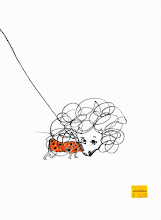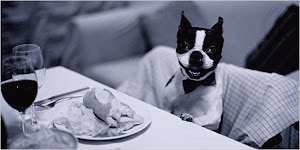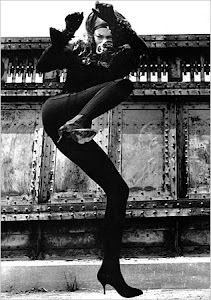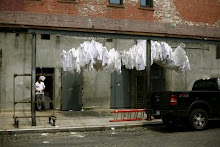What Was Lost is one of those books you will be hearing about everywhere, as it has enjoyed one of the debuts that seem to happen with greater and greater frequency: a hitherto unpublished and very young author comes out of the gate at a gallop, wins or is shortlisted for things her elders can only dream of, and the book soars to the top of bestseller lists worldwide before being optioned by Miramax (if that's what Miramax does) or Plan B, the production company begun by Brad Pitt and Jennifer Aniston. Plan B options all the good books.
The story begins with a charming take on the Harriet the Spy genre, with Kate Meaney, not mean at all, junior detective. With her notebook and trusty partner Mickey in tow (Mickey being a stuffed monkey who wears a striped suit and spats) she trails suspects through the big shopping centre near her home.
Like Harriet she is sort of lonely and quite an outsider and therefore develops into an interesting, engaging and original character. Her best friend is the son of the news agent, who is really much too old to befriend a ten year old. But, he's a bit of a misfit too and friendship occurs wherever it occurs if you wouldn't mind keeping your filthy suspicions to yourself.
And then the story veers off into a tale of dead ends of all kinds, missed opportunities, missing people, the dead and deadness. Is "deadness" a word? It is certainly a feeling and it pervades the book like the smell of every shopping mall with a fast-food court.
As it turns out, Kate gives someone a life while her disappearance off the face of the earth ends many others, namely that of her friend who could never shuck the suspicion that he was involved in her vanishing. Throughout the book I was hoping that Kate somehow managed to escape the council estate she lived in, managed to disappear into a new life as any undercover junior detective should be able to do.
Heavy treading, this.
The thing is, the entropy, the vortex of same-same and the slow, imperceptible death of hope can really catch even a tiger by the tail. It is so easy to slip into a relationship that's all very nice but not very good, a job that is just a job, it is so easy to let guilt and weakness define you.
I was reading over the weekend a story about how Hillary Clinton is coping with the reality that she may very well not win the nomination despite her hard work, worthiness and determination. One thing struck me -- she is pragmatic, the story said, and knows well enough that someone has to lose but right now she's still got to keep on winning and so simply does not read or listen to anything that nay-says. She needs to keep her eye on the ball, she needs to stay optimistic.
What a practical thing to do. Simply don't let the bad stuff into your head.
And so, as an antidote to this very excellent but nonetheless heavy book I read Vogue cover to cover. Our Biggest Spring Issue Ever! Why Vogue? It is relentlessly upbeat even when it isn't -- even the sad stories about cold mothers and sensitive daughters or whatever are sort of couched. Mother and daughter are attractive and have loads of advantages -- I mean really, they're profiled in Vogue! Vogue is the home of the vitamin enriched sons and daughters of money in the bank, to re-use one of my favorite phrases, and on every page there is the assurance that everything is possible, a pretty girl can decide to design a bag and voila! she's a successful entrepreneur! You can marry a prince really and truly! You can have a glamorous-sounding job that is both truly glamorous and so are you!
Sometimes you need the fairy tales of magazines to offset the hard truths of fiction.
Monday, February 25, 2008
Tuesday, February 19, 2008
Then We Came to the End
Every once in a while you recognize hey, I'm marching to a different drummer. I live outside the zeitgeist. I'm not the maven on this one. Actually I just don't get it.
Such is my feeling upon completing this first novel which has won great critical acclaim, near-awards and bestseller status. So thrilled with it is its publisher that there is a run of advanced reading copies for the trade paper edition, all the better to further activate buzz from those who didn't receive the hard cover ARC. In fact, the publisher's letter on the back of this same advance reading copy alludes to The Great American Novel with comparisons to Gatsby.
Gatsby? Really?
My first crack at this book was in New York, where I was staying in a fabulous hotel in the lower east side mere steps from the Bowery Mission. The combination of the tension of the book, which is about a bunch of advertising types undergoing a series of layoffs, plus New York plus the up close and personal view of where being down and out can take you all added up to shelving it.
But so many of the great readers in my life have loved this book I felt I had to give it another go. "Get past the first 100 pages and you'll love it!" they said.
Love it I did not.
The book is written in the royal "we" but that's not annoying. It is written about a group of people so morally vacuous that diatribes about the serial numbers on "buckshelves" seems reasonable. Their collective madness and unravelling leaves little to glom on to, none of the characters seem either very nice or even very smart.
Take for example one guy who is distraught because his mistress won't commit to an abortion. "My life will be ruined" he laments -- not, "I ruined my life" by which he really means "I ruined my wife." This is a common strain in real life I admit, so perhaps kudos to the author for noticing.
Among the others of "we" are those who go to McDonald's to observe a grieving mother who cannot help but go to the ball room where her dead daughter played, in order to conjure the child. They observe but in a "can you believe it?!!" way which I am happy to say I don't recognize.
One of the best sections is about the feared head of the agency, who has made many "walk Spanish" (down the plank) to joblessness, who is terrified of the hospitals that will not cure her cancer but rather subject her to numerous humiliations before she dies. Fair enough. This cancer-addled woman loses her mind but finds that her boyfriend is capable of generous, compassionate, imaginative care of her -- really, his approach is knight on a white steed -- but then he feels he needs to tell her, lest she get the wrong impression, that while he will help through the puking and the aching and the other forms of horrible, he really has to say that there's no future for them.
How startling, how cold, how tragic to know in the face of your own mortality that no one actually loved you enough. That someone so lovely did not love you enough.
This book is devastating and that is, I suppose its beauty for sturdier souls. It has a Russian, not American, vibe -- the dispassionate reportage of moral failings strikes me as distinctly of that ilk rather than the rather grandiose and affirming Great American Novel. It is a consummate act of writing. That the author gets away with "we" so easily, and deals with 9-11 so elegantly (my pet peeve is with books that use this as a plot point -- c'mon, try harder....) and lets its characters (there is no protagonist but "we" -- kind of profound, that...) squirm in their own cheap squalor -- well, that's some good and disciplined writer.
Sadly this is not, to me anyway, an enjoyable book. Necessary, prescient, smart, maybe. But bloody hard to face.
Such is my feeling upon completing this first novel which has won great critical acclaim, near-awards and bestseller status. So thrilled with it is its publisher that there is a run of advanced reading copies for the trade paper edition, all the better to further activate buzz from those who didn't receive the hard cover ARC. In fact, the publisher's letter on the back of this same advance reading copy alludes to The Great American Novel with comparisons to Gatsby.
Gatsby? Really?
My first crack at this book was in New York, where I was staying in a fabulous hotel in the lower east side mere steps from the Bowery Mission. The combination of the tension of the book, which is about a bunch of advertising types undergoing a series of layoffs, plus New York plus the up close and personal view of where being down and out can take you all added up to shelving it.
But so many of the great readers in my life have loved this book I felt I had to give it another go. "Get past the first 100 pages and you'll love it!" they said.
Love it I did not.
The book is written in the royal "we" but that's not annoying. It is written about a group of people so morally vacuous that diatribes about the serial numbers on "buckshelves" seems reasonable. Their collective madness and unravelling leaves little to glom on to, none of the characters seem either very nice or even very smart.
Take for example one guy who is distraught because his mistress won't commit to an abortion. "My life will be ruined" he laments -- not, "I ruined my life" by which he really means "I ruined my wife." This is a common strain in real life I admit, so perhaps kudos to the author for noticing.
Among the others of "we" are those who go to McDonald's to observe a grieving mother who cannot help but go to the ball room where her dead daughter played, in order to conjure the child. They observe but in a "can you believe it?!!" way which I am happy to say I don't recognize.
One of the best sections is about the feared head of the agency, who has made many "walk Spanish" (down the plank) to joblessness, who is terrified of the hospitals that will not cure her cancer but rather subject her to numerous humiliations before she dies. Fair enough. This cancer-addled woman loses her mind but finds that her boyfriend is capable of generous, compassionate, imaginative care of her -- really, his approach is knight on a white steed -- but then he feels he needs to tell her, lest she get the wrong impression, that while he will help through the puking and the aching and the other forms of horrible, he really has to say that there's no future for them.
How startling, how cold, how tragic to know in the face of your own mortality that no one actually loved you enough. That someone so lovely did not love you enough.
This book is devastating and that is, I suppose its beauty for sturdier souls. It has a Russian, not American, vibe -- the dispassionate reportage of moral failings strikes me as distinctly of that ilk rather than the rather grandiose and affirming Great American Novel. It is a consummate act of writing. That the author gets away with "we" so easily, and deals with 9-11 so elegantly (my pet peeve is with books that use this as a plot point -- c'mon, try harder....) and lets its characters (there is no protagonist but "we" -- kind of profound, that...) squirm in their own cheap squalor -- well, that's some good and disciplined writer.
Sadly this is not, to me anyway, an enjoyable book. Necessary, prescient, smart, maybe. But bloody hard to face.
Saturday, February 16, 2008
Listen to the music
Being utterly unable to focus and read anything remotely challenging I find myself in a swath of magazines, celebrity gossip and fashion websites and hidden behind a stack of otherwise utterly embarrassing Chick Lit and murder mysteries (one felt so oddly familiar I must have already read it but of course could not remember who died or why I cared). And please Harlen Coben, stop making me think you are Dennis Lehane -- I buy these Cobens only to hurl them against the wall. Cannot stand the lovable lug who stars in these and his completely boring "perky" girl next door girlfriend.
The season of hearts and flowers has, thankfully, just slid by -- the cinemas are still filled with date night Rom Coms but that will pass soon enough. Still, the season has led me back to easy-to-read, because so often read before, poetry.
I find myself drawn to the cadence and language, and the shimmer of the big ideas behind the beautiful words. Reading poetry, especially familiar poetry, is soothing and soul-feeding -- it feels like rubbing fingers against smooth and warm worry beads and is a faithful reminder that the quotidien is not all there is.
Poetry soothes as music does, holding a rhythm akin to heartbeat. Shakes up the brainwaves at the same time.
Try it. Try reading Auden, my best friend when not in the thrall of Eliot (I did say it's great to return to the familiar) or even the Sonnets: "Love is not love which alters when it alteration finds".... Okay, so you grew tired of this one after all those weddings of your youth but still, this is an encouraging assurance that it's not you it's him, isn't it? My favorite Sonnet is 119. That's a sonnet for a girl who's been around, let me tell you.
Or Anne Sexton. Or read "Daddy" and count yourself lucky. Or William Carlos Williams. Read To Elsie, where "the pure products of America go crazy" -- this is a poem for someone who grew up in ugliness and maybe beat it, a wonderful show of understanding and empathy for those who could not. It ends with poignancy, and if you don't feel the fire of "gotta keep kicking against the pricks" then you are Elsie and have a friend in Williams: "It is only in isolate flecks that something is given off/No one to witness and adjust, no one to drive the car."
Poetry makes you think bigger, in spite of yourself.
The season of hearts and flowers has, thankfully, just slid by -- the cinemas are still filled with date night Rom Coms but that will pass soon enough. Still, the season has led me back to easy-to-read, because so often read before, poetry.
I find myself drawn to the cadence and language, and the shimmer of the big ideas behind the beautiful words. Reading poetry, especially familiar poetry, is soothing and soul-feeding -- it feels like rubbing fingers against smooth and warm worry beads and is a faithful reminder that the quotidien is not all there is.
Poetry soothes as music does, holding a rhythm akin to heartbeat. Shakes up the brainwaves at the same time.
Try it. Try reading Auden, my best friend when not in the thrall of Eliot (I did say it's great to return to the familiar) or even the Sonnets: "Love is not love which alters when it alteration finds".... Okay, so you grew tired of this one after all those weddings of your youth but still, this is an encouraging assurance that it's not you it's him, isn't it? My favorite Sonnet is 119. That's a sonnet for a girl who's been around, let me tell you.
Or Anne Sexton. Or read "Daddy" and count yourself lucky. Or William Carlos Williams. Read To Elsie, where "the pure products of America go crazy" -- this is a poem for someone who grew up in ugliness and maybe beat it, a wonderful show of understanding and empathy for those who could not. It ends with poignancy, and if you don't feel the fire of "gotta keep kicking against the pricks" then you are Elsie and have a friend in Williams: "It is only in isolate flecks that something is given off/No one to witness and adjust, no one to drive the car."
Poetry makes you think bigger, in spite of yourself.
Monday, February 4, 2008
Chick Lit
I know it is a huge money-maker for publishers and movie companies alike but so-called chick lit irritates me. Shopaholic? Get over yourself. Bridget? Too hapless by half. I swear we women do ourselves no service by having these heroes in our lives.
So imagine my acute surprise to discover myself addicted to books by Marian Keyes. These are uber-chick lit and I cannot put them down. I hope Marian is in some garret in Ireland somewhere typing her fingers to bloody stumps because I am very nearly finished the entire oeuvre.
These books should have nothing going for them according to me, with my current and perpetual prejudices -- they take place in the UK, there are many cute Britsy phrases ("dashing over the road to the shops" when you mean crossing a major artery to go to a store); there are references to places and "shops" that are strictly off-limits as all of the above are reminders of he who must not be remembered. Worst of all, love always turns out just fine in these books, and this is super-verboten.
Still, Keyes' books are charming and funny, lighthearted in fact, which is exactly what we need in heavy February, when the sun has gone missing for what is now months at a stretch. The characters are not so much hapless and quirky as they are completely mad, or vile but in a funny way. In Anybody Out There? a sister consoles her very recently and heartbreakingly widowed sibling by saying "lucky you he didn't run off with some other woman or I'd have to kill him" or words to that effect; this is comfortingly familiar in that it is precisely the kind of consolation my mother would give me, she being of the "it could always be worse" school of sympathy (sic).
Keyes' stories are set in big cities rife with amusing and attractive men -- this is where they veer into full-on fairy tale but not without precedent. She is not so far from Jane Austen -- I know there are lots of nuances in Austen, I'm not denying that, but it is kind of frustrating that no matter how desolate the village or impoverished the girl there is always a dashing man "just over the road" to save her from a life of squalor. I live in a city of millions and I can assure you there is no dashing man anywhere in sight.
Rules are made to be broken, and the rule against chick lit is hereby bent. Do try the Keyes backlist. These books add a ray of sunshine to a foggy day.
So imagine my acute surprise to discover myself addicted to books by Marian Keyes. These are uber-chick lit and I cannot put them down. I hope Marian is in some garret in Ireland somewhere typing her fingers to bloody stumps because I am very nearly finished the entire oeuvre.
These books should have nothing going for them according to me, with my current and perpetual prejudices -- they take place in the UK, there are many cute Britsy phrases ("dashing over the road to the shops" when you mean crossing a major artery to go to a store); there are references to places and "shops" that are strictly off-limits as all of the above are reminders of he who must not be remembered. Worst of all, love always turns out just fine in these books, and this is super-verboten.
Still, Keyes' books are charming and funny, lighthearted in fact, which is exactly what we need in heavy February, when the sun has gone missing for what is now months at a stretch. The characters are not so much hapless and quirky as they are completely mad, or vile but in a funny way. In Anybody Out There? a sister consoles her very recently and heartbreakingly widowed sibling by saying "lucky you he didn't run off with some other woman or I'd have to kill him" or words to that effect; this is comfortingly familiar in that it is precisely the kind of consolation my mother would give me, she being of the "it could always be worse" school of sympathy (sic).
Keyes' stories are set in big cities rife with amusing and attractive men -- this is where they veer into full-on fairy tale but not without precedent. She is not so far from Jane Austen -- I know there are lots of nuances in Austen, I'm not denying that, but it is kind of frustrating that no matter how desolate the village or impoverished the girl there is always a dashing man "just over the road" to save her from a life of squalor. I live in a city of millions and I can assure you there is no dashing man anywhere in sight.
Rules are made to be broken, and the rule against chick lit is hereby bent. Do try the Keyes backlist. These books add a ray of sunshine to a foggy day.
Subscribe to:
Comments (Atom)











